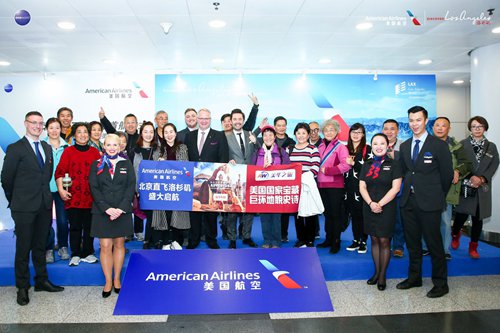
Passengers and American Airlines staff members on Monday celebrate the opening of the nonstop air service between Beijing and Los Angeles. Photo: Courtesy of American Airlines
American Airlines (AA), the world's largest carrier by fleet size, commenced its nonstop daily passenger service between Beijing and Los Angeles on Monday, the first US airline to offer such service between the two countries.
It is the eighth nonstop service for AA to China and the 16th transpacific route for the carrier after it started the business 11 years ago in China.
Before that, Air China operated this route for many years three times per day.
Industry watchers believe the newly opened route could drive more profit as Los Angeles has become a hot destination for many passengers traveling from China.
Last year, Los Angeles welcomed more than 1 million travelers from the Chinese mainland, meaning one-third of all tourists traveling from the mainland to the US would have flown to Los Angeles, Ernest Wooden Jr., president and CEO of the Los Angeles Tourism and Convention Board, said during an interview in Beijing on Tuesday.
"In 2016, the spending for Chinese exceeded more than $1.6 billion and we believe the growth could keep up with a pace of more than 10 percent in the next few years," he remarked, noting the target of the Los Angeles Tourism and Convention Board is 47.3 million travelers this year and 50 million by 2020.
However, it wasn't so easy for AA to win the slot.
In November 2016, the carrier was granted permission from the Department of Transportation of the US for the route, but there was a delay due to the slot being tight in China.
Smart partnership
In March this year, AA agreed to pay $200 million for a 2.9 percent stake in China Southern Airlines, China's largest airline in terms of fleet size. It is widely believed that the successful bid for the route from Beijing to Los Angeles is closely connected to the China Southern deal.
"AA and China Southern are seeking to codeshare as AA has been approved by the Department of Transportation and is waiting for approval by the Civil Aviation Administration of China," Shane Hodges, managing director of AA's Asia Pacific Sales, said in an interview on Tuesday.
According to AA, it plans to codeshare domestic flights in China with China Southern, with the number of destinations estimated to reach 14, including Guangzhou in South China's Guangdong Province and Dalian in Northeast China's Liaoning Province.
Further collaborating with China Southern, AA has moved from Terminal 3 to Terminal 2 at Beijing Capital International Airport in a bid to share the same terminal with the airline giant.
"Currently, the transit time has been cut from 150 minutes to 100 minutes," said Russ Fortson, managing director of AA's Asia Pacific Operations, noting the move to Terminal 2 could help passengers transfer to more than 30 cities in China with the help of China Southern in a timelier manner.
However, he said the carrier has not decided to move to the new airport located in the southern part of Beijing, which is due to start operation in 2019.
On Monday, Qatar Airways announced it has acquired a 9.6 percent stake for $662 million in Cathay Pacific, Hong Kong's troubled flag carrier.
The two airlines both belong to the Oneworld airline alliance.
When asked to comment on the cooperation, Hodges said the airlines industry is very complicated and it is not only that the world's three alliances - Oneworld, Skyteam and Star Alliance - are conquering the world, but the members within those alliances are gradually forming some very complicated cooperative networks.
AA also belongs to Oneworld.
"We accept the complexity of the airlines industry, but also accept the cooperation under the alliance; it is not a market of black and white. Sometimes, it is good for us when it is grey," he said.
Hodges is quite frank about AA's market strategy, saying the AA holds advantages in both the US and Latin American markets. But the company also has confidence in the Asian market, as shown by its targeting of major Chinese cities such as Beijing and Shanghai.

